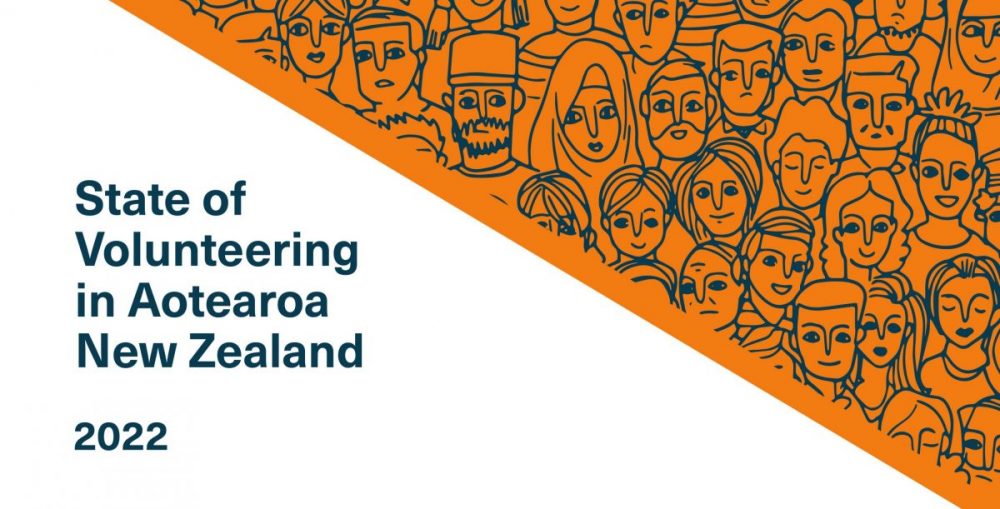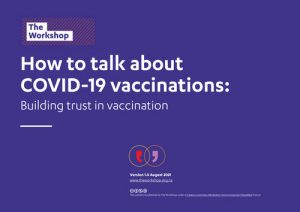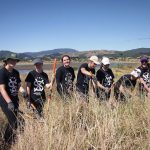News
Stay updated with the latest from Volunteering New Zealand


Community
Diversity
Inclusion
Social justice
International Volunteer Day 2022 – Resources

International Volunteer Day (IVD), on 5 December 2022, has the theme of solidarity through volunteering.
For the future of our planet, we must act together and we must act now.
This is not an era to stand alone but together, as one, in solidarity with each other.
On 5 December, let's join with all volunteers across the globe to recognise the power of volunteering.
Volunteering is where compassion meets solidarity.
Both share the same core values – supporting each other from a position of trust, humility, respect and equality.In the lead up to #IVDAY2022, join us to celebrate the spirit of volunteerism.
We are proud of all volunteers who are role models in their communities and whose actions inspire hope.Read our media release: Volunteers ensure communities supported.#IVD2022 – Start promoting todayDownload these resources
- Copy for social media/ website: 50/100/200 words
- Facebook header V01
- Facebook header V02
- Facebook header V03
- Web header V01
- Web header V02
- Social media post V01
- Social media post V02
- Social media post V03
- Email signature V01
- Email signature V02

Advocacy
Inclusion
Latest News
Mahi Aroha
Research
State of Volunteering update
Volunteering New Zealand’s deep dive into the state of volunteering is nearing completion. In this update we tell you what we set out to do, the research we undertook and the key themes of our report. We’re aiming to have the substantive report out before the end of 2022. Sub-reports will follow.
Pre-design consultation
We kicked off our SOV2022 with a pre-design consultation with stakeholders.
This informed how we designed our research.
The main needs were: capturing the view of Māori, Pacific and other ethnic communities; capturing regional data where possible; gauging volunteer wellbeing and understanding motivations.
Methodology
We applied a mixed methods research methodology to studying the state of volunteering in Aotearoa in 2022. This included:
- Focus groups with Māori volunteers
- Interviews with young people and volunteers with disabilities
- Utilising current research on Pacific peoples
- Surveys with volunteers
- Surveys with volunteer-involving organisations
- Lessons from Te Ao Māori and Kaupapa Māori
We received rich, diverse and inspiring views from across New Zealand.
We hope to be able to provide some regional insights.
Key themes
The research report will synthesize the information around a series of themes:
- Barriers and motivations for volunteering
- Volunteering and Whakawhanaungatanga: relationships and connections
- The public, organisational and personal benefits of volunteering
- Recognising and valuing volunteers and volunteering
- The impact of Covid-19 on volunteers and volunteering
- Diversity and inclusion in volunteering theory and practice (including volunteers with disabilities, Pasifika, youth, Māori)
We have a draft supplementary report on Māori and mahi aroha, and aim to have additional supplementary reports on Covid learnings, and regional analysis ready for release in 2023.We look forward to sharing the results with you in webinars and other fora.
If you have any question or comments, please email: office@volunteeringnz.org.nz

Campaigns
Leadership
International Volunteer Managers day 2022 resources

International Volunteer Managers Day (IVMDay) is held annually on 5 November.
The theme this year 200 is Many Backgrounds – One Profession – Stronger Together.Volunteer managers responded to the challenges of the last year with strategic leadership and created partnerships and collaborations to continue to thrive.For some, their own health and wellbeing suffered as they kept their teams operating to support their communities.Volunteer Managers are the key to successful volunteer involvement.To mark IVMDay, we’ve selected our top six VNZ resources, tools and research to support managers of volunteers!
Please share with any managers of volunteers that you know.1. Lead MeMaximise your volunteering leadership potential.
Take this quick and easy assessment.
At the end, we’ll email you a status report, an action plan for change, and links to useful resources.2. On-demand learningWatch webinars on demand, including newly added topics for 2022: Pasifika unpaid work, youth participation in governance and skills from volunteering for job hiring.
Our guest presenters are leading national and international speakers, exploring topics on volunteering to help you better lead, manage and develop your volunteer workforce.3.
Regional training and eventsWe collate upcoming training and events from across the motu.
Many are online and free, giving you access to learning wherever you are.4.
Volunteers and the lawThere are a range of laws that have implications on how organisations interact, treat and manage volunteers.
We have collated information about employment, health and safety, volunteer rights and volunteer expenses.5. Volunteering resourcesWe collate and continually update resources to support managers of volunteers and the governance of volunteer-involving organisations.
These resources include practical advice and strategies from leading national and international organisations and contributors.
See: https://www.volunteeringnz.org.nz/available-resources/6. InvolveMeInvolveMe is an online self-assessment tool that helps you make a great volunteer programme.
Survey your organisation to get the best out of your volunteer programme!
InvolveMe provides you with a broad set of questions that are then summarised into a smart and easy to understand report.
This report makes it a breeze to self-identify where you or your organisation can improve its effectiveness.Any questions about these resources?Please contact us at office@volunteeringnz.org.nz.About the 2022 themeThe theme for 2022 is: “Many Backgrounds – One Profession – Stronger Together”. This theme conveys a strength the volunteer leadership sector possesses that we don’t draw on enough… the huge and diverse range of backgrounds that volunteering leaders come from.
On one hand – we come from a wide range of professional backgrounds.
We are also made up of people from all walks of life and different cultural backgrounds.
We believe that this diversity of backgrounds should allow us to think differently, we can find solutions together when we come at issues from different perspectives.
As we all have different skill sets we should be able to collectively collaborate and use these more productively.
#IVMDAY22 – Start promoting today.Download:
- Facebook header
- Twitter header
- Social media theme post
- Engagement post V01 – "Before I was a Volunteer Manager, I thought I would be..."
- Engagement post V02 – "Before I was a Volunteer Manager, I thought I would be..."
- Engagement poster V03 – "Before I was a Volunteer Manager, I thought I would be..."

Advocacy
Latest News
Research
VNZ Events
VNZ in the News
Community Sector Engagement Group meeting
The Community Sector Engagement Group met with the Hon Priyanca Radhakrishnan, Minister for the Community and Voluntary Sector, on 11 August 2022.Volunteering New Zealand is a representative on this sector engagement group, which meets regularly with our Minister for the Community and Voluntary Sector.The Minister acknowledged the opportunity to regularly engage with the CSEG as these meetings provide a platform to check in and discuss the on-going impacts of COVID 19 and the support provided by the sector to communities.The Minister spoke to the importance and impact of the Community Organisations Grants Scheme (COGS) and commented on the issue that it and has been operating with an outdated funding formula for several years.
This is resulting in inequitable distribution of funding to communities.
Further to this, the appropriation has not increased for a number of years.As a member of the Lottery Grants Board, the Minister raised the Board’s programme to evolve the Lottery funding model Kia Tipu, He Tipua Work Programme to make it easier, equitable and fairer for communities, hapū and iwi to access funding.
High-level options for evolving the Lottery Funding Model will be presented to the Lottery Grants Board in November.The report on Strengthening our Approach to Volunteering was released by the Minister in June 2022 as part of the National Volunteer Week.
A key recommendation of the report was to establish a Cross-agency Steering Group to develop a strategic approach to volunteering across government.
The group has been established and met for the first time on 28 July 2022.The review of the best practice guidelines for volunteers is another key recommendation of the report and is being progressed by Volunteering New Zealand, supported by the Department.The Charities Act changes include introducing a more accessible appeals body for charities to challenge decisions, and new powers to reduce reporting requirements for small charities.
The Minister has introduced a bill to parliament and is aiming to pass it next year.
There will be an opportunity to make submissions to the select committee.
The minister encourages groups to get involved with the process to make sure we get the accurate legislative changes.The Group discussed some of the key issues currently facing the community and voluntary sector including:- Ongoing impacts of COVID-19 for the sector- significant concern across the community sector around the well-being of workers.- that people/volunteers are experiencing high levels of exhaustion- cost of living as a significant issue both in terms of demand for more community support and the costs for non-profits to deliver services- administration burden of community groups reporting to different government agencies and simplifying accountability requirements.- desire to support Government agencies in using a community led development approach- how Government agencies can work effectively with Pasifica and Māori- impact of the anti-money laundering legislation on community organisations in terms of banking and complianceThe next meeting of the group will be in November.
Please email Michelle Kitney - michelle@volunteeringnz.org.nz with any thoughts or ideas to contribute to this meeting.

Diversity
International
Leadership
Harnessing the energy of volunteering
Now is a great time to harness the energy of volunteering, adapting volunteering to a post-Covid world and seeking out diverse volunteer audiences, according to two articles from Engage.In Is there a New Energy in Volunteering?, Rob Jackson and Erin Spink say they are seeing many new initiatives to develop strategies, visions and plans for volunteering.“As the world and people’s lives change, so too must volunteering shift to fit within new ways of living, emerging priorities and values and ways of connecting.
It is timely for new strategies, visions and action plans to be developed to explore how volunteering needs to adapt in a post-Covid world.”They say that volunteering is at an all-time high in public and organisational consciousness and that volunteering gives us hope that we can change the world for the better.The authors cite England’s “Vision for Volunteering” as a great approach. “It doesn’t faff about with naval-gazing definitions of volunteering… powerfully, it puts volunteers at the heart of volunteering.”However, volunteerism exists within social institutions and power structures, so in order to make volunteering more inclusive, key changes need to be made, the authors say.In a second article, Overcoming Unseen Barriers: How to Authentically Engage Diverse Volunteer Audiences, author Sam Fankuchen suggests a way volunteer managers can champion inclusion.“The beauty of volunteering, to me, has always been that it can present an opportunity for each of us – over a session or over a career – to prioritize someone else’s needs and see the world through their eyes for a moment.
And these moments cannot happen without diversity, equity, inclusion and belonging.”He defines these terms as:
- Diversity – representation of a range of stakeholders who identify differently in one or more facets of our being
- Equity – similar access to opportunity, even when our diversity may obscure that opportunities exist and be reasonable, possible and fair to pursue
- Inclusion – welcoming design of a programme or opportunity for anyone capable of participating
- Belonging – internalising the feeling of sincere engagement in purpose and action.
Engaging with a broader audience could make the difference between how a programme operates now, and the potential for the best version of a programme.Fankuchen suggests ways to engage with a diverse audience, including asking detailed questions about how an audience member defines themselves, and using technology to enhance the users’ experience.“When you make small efforts to be more inclusive, bigger patterns emerge.
Suddenly you make small realizations, implement incremental changes, and witness broader reach and engagement.”These articles can be read in the Engage Journal, an online journal for volunteer engagement leaders.
Volunteering New Zealand members can receive access to Engage free of charge.
Email: office@volunteeringnz.org.nz if you are interested.

Research
Sustainable Development Goals
Volunteers
Wellbeing
Volunteering and wellbeing
The introduction of Treasury's Living Standards Framework into the 2019 Budget is being greeted enthusiastically by a number of organisations including Volunteering New Zealand.
The Wellbeing Budget, as it is known, will take a more holistic approach to valuing what is important to New Zealanders, including for the first time, social and environmental indicators as well as measures of economic health.
Work in the area of wellbeing has become established over the last decade both internationally and in New Zealand and many of the objections and obstacles to measuring "intangibles" such as wellbeing have been overcome.The Living Standards Framework will measure the progress of four capitals:
- Produced capital - infrastructure assets
- Human capital - skills, knowledge, and human health
- Social capital - norms and values like trust and cultural identity
- Natural capital - the environment as a resource
So how can volunteering contribute to wellbeing?
Volunteering can build value in our capital stocks in some obvious ways.
For example, sports volunteering enhances the health of those who take part, while environmental volunteering helps to protect natural resources.
But just about any kind of volunteering can contribute to social and human capital in the sense that volunteering is both a social interaction and an opportunity for learning and development.
As opposed to traditional measures of capital, social and human capital are not depleted with use.
Time spent sharing trust and knowledge are investments that can increase the total value of New Zealand's productive resources.
Volunteering and wellbeing: the evidence
In order to study the effects of volunteering on subjective wellbeing, social scientists are careful to control for what they call "confounding" or "lurking" variables - unobserved variables that seem to suggest relationships between other variables that do not exist.
For example, an increase in sales of ice cream and an increase in the murder rate over the summer months does not suggest that one causes the other.
Rather, another variable, the weather, is likely to explain why ice cream sales go up.

In our research section, we have provided a link to a 2012 study by Martin Binder and Andreas Freytag which provides a robust and causal demonstration of the impact of regular volunteering on subjective wellbeing using a large-scale data set, the British Household Panel Survey.
Perhaps the main finding is that "regular volunteering significantly increases well-being" and that the "causal effect of volunteering ... increases over time for individuals who continue their volunteering efforts." Genuine volunteering - that is, volunteering that is conducted by choice not obligation - is unlikely to have negative effects.
However, examples of people who benefit the most from volunteering are retired persons, the lonely or the unemployed.Binder and Freytag test the robustness of their results by controlling for numerous "confounders" such as personality traits, social networks and trust as well as comparing across demographic slices such as gender, age, education, frequency of social contact and so on.In addition to their main findings on wellbeing, the authors also summarise the benefits of volunteering as studied elsewhere.
These studies find that volunteers report better outcomes across a number of terms related to or synonymous with wellbeing including health, social life, socio-economic prospects, happiness, positive affect for the elderly, and life satisfaction.

International
Latest News
Leadership
Revolutionary Leadership for 21st-Century Volunteering
Your views on volunteer management will get a seismic shake-up from this article by author and volunteer management expert Martin J.
Cowling published in the ENGAGE journal.Here is a summary.
Volunteering trends
Volunteering has changed and Covid-19 simply exposed that change.
Our older volunteers are disengaging from volunteering and most organisations are completely failing to attract the newer generation.
Volunteering has to compete for the most valuable resource humans have: time.
In many countries, we have seen a massive ‘shock’ in volunteering numbers.
Participation rates have plunged, the hours contributed declined and organisations are reporting that ‘their’ volunteers are simply not returning.BUT people are still committed to causes they are passionate about and willing to give time for them.
Somewhere between these people wanting to make a difference and our current volunteering organisational models lies a huge chasm.
Cowling argues that leaders of volunteers need to bridge that gap with a revolution.
Only they can mobilise the community to solve the issues of the community.
New standards needed
Cowling gives seven standards that revolutionary leaders need to create a vision of volunteering in the 21st century.
- Sell the impact of volunteering.Ask your volunteers, how has volunteering for us impacted you?
- Then use that information to sell volunteering to your community.
- Create a strategic organisational view of volunteering.Volunteering needs to be front and centre of an organisation’s community impact and fundraising strategy
- Redefine volunteer characteristics.
- For example, volunteers want have a sense of wonder and excitement, to do something meaningful, use their skills, and connect with others.
- Maximise flexibilityTraining and volunteering needs to when people have spare time e.g. weekends, and in the way they want e.g. online.
- Maximise visibilityEngage members of your community using the internet and social media.
- Embrace diversityDo your materials and practices address your diverse audiences?
- Maximise volunteer satisfactionVolunteers are brand ambassadors for volunteering.
- If volunteering is negatively impacting your volunteers, make changes.
- Check in regularly with volunteers to find out how satisfying volunteering is for them.
Which of these practices will you change up?The full article can be read in the Engage Journal, an online journal for volunteer engagement leaders.
Volunteering New Zealand members can receive access to Engage free of charge.
Email: office@volunteeringnz.org.nz

Advocacy
Recognition
Volunteers
Wellbeing
Volunteering added to Living Standards Framework
Living Standards Dashboard now includes volunteering indicators Treasury has a refreshed Living Standards Framework (LSF) Dashboard, which now includes indicators and measures relating to volunteering.In April 2022 Caralee McLiesh, Secretary to the Treasury launched the paper Trends in Wellbeing in Aotearoa New Zealand, 2000-2020 (Wellbeing Trends Report) and a refreshed LSF Dashboard.Volunteering New Zealand is excited to see it includes new indicators relating to volunteering are now included in the LSF Dashboard.DOMAINIndicatorMeasuresWork, care and volunteering domainVolunteeringPercentage of adults who reported having done voluntary work in the previous four weeks.
Source: New Zealand General Social Survey (Stats NZInvolvement in the community Definition: Proportion of young people who report helping others in the neighbourhood or community (eg, helping out on the marae or at church or belonging to a volunteer organisation).
Source: WhatAboutMe surveyCivil SocietyNon-profit operating surplus Definition: Operating surplus for the non-profit sector as a proportion of income.
Source: Source: Non-profit institutions satellite account (Stats NZ)One of New Zealand’s areas of strength is in the work, care and volunteering domain.
We have high employment, high job satisfaction, low unemployment, and the highest rate of volunteering in the OECD.

Other key information highlighted in these reports include that volunteering appears more common among people aged 35-74 and includes both direct volunteering and volunteering for an organisation.

The Wellbeing Trends Report investigates how wellbeing in New Zealand compares to other countries, how wellbeing has changed over time, and how wellbeing is distributed across various groups of the population.The updated LSF Dashboard includes new indicators on the health of institutions, and measures that reflect child wellbeing-such as child poverty in the income domain, childhood injuries in the safety domain, and caring and support for young people in the redefined family and friends domain.The Wellbeing Trends Report and updated LSF Dashboard have informed the publication Te Tai Waiora: Wellbeing in Aotearoa New Zealand 2022, a new requirement under the Public Finance Act.
The Treasury has drawn on the Living Standards Framework and He Ara Waiora to provide insight into a range of aspects of life that New Zealanders value.
Te Tai Waiora uses these frameworks to provide a high-level overview of wellbeing in Aotearoa New Zealand, how it has changed over decades, and how well we are positioned to sustain our wellbeing over time.

Advocacy
Volunteers
Youth
Youth Volunteers shine this National Volunteer Week
It’s time to highlight one of our greatest resources, youth volunteers, this National Volunteer Week Te Wiki Tūao ā-Motu 19-25 June. “You can cite quite a few benefits, from skill building to CV improvements, but in all honesty, I don’t volunteer because of anything as tangible as that.
I volunteer because it helps me to hope,” says Dante Dawes, a Youth Working Group member.Formed in 2021 to determine how youth representation at a governance level within Volunteering New Zealand should take place, VNZ’s Youth Working Group (YWG) brings together young minds from all around the country who understand the importance of incorporating and supporting youth voices in organisations, especially at a decision-making level.How the YWG is making a differenceOur team of eight recognises there are a lot of different ways to support the youth voice in this space.
We have identified a number of projects that aim to make a difference.
For rangatahi keen to volunteer, it can be hard to know where to begin - we’re creating a monthly newsletter which aims to provide a convenient way to start people on their journey while recognising that volunteering can feel overwhelming to youth who feel they lack the skills.
Tying into this work, we want to focus on projects which upskill our youth.
We hope to do this by organising, advertising and hosting workshops aimed at teaching youth how to grow their skill-set through volunteering, and get the most out of their efforts.
We want to build a community as volunteering is so much more valuable when there are others alongside you.
Another project involves us reaching out to other youth councils to build a strong network of like-minded people and form a cohesive network of passionate volunteers.Importance of youth engagement and involvement “While youth are juggling everyday life and trying to find what they are passionate about, organisations and society should remember that when they have a young person on board, their voices should be heard and valued as they are a significant part of society,” Swetlana Khoo a YWG member says.
And why does the youth voice matter?
Because our world is going through a massive transition phase.
The knowledge and experience of long term volunteers will always be of the utmost importance.
But as we shift to a new age of social media, digital content and casual volunteering, organisations need a wider array of skills, some of which can only be offered by youth, as the ones born and raised in that environment. Our call to actionAotearoa New Zealand’s youth bring new ideas and diverse perspectives.
We’re incredibly lucky to have so many passionate student volunteers who spend their precious free time helping our communities thrive, now let’s make sure they’re given their time to shine.This week we call on leaders who depend on young volunteers to step up and:
- Build spaces for youth representation at a decision-making level.
- Support youth volunteers balancing work, study and life commitments.
We applaud the many organisations already adding a seat to their board table for youth members.
We encourage these organisations to widely promote their youth board positions.

Volunteers
Wellbeing
Vaccines and volunteers
Vaccines are free for everyone in New Zealand aged 5 and over.A lot of the advice around vaccines refers to workers.
It is important to note, in regards to vaccinations, the term "Workers" includes both paid and unpaid workers.Vaccines are voluntary and individuals cannot be forced to have a vaccine.
However, some work environments have mandated vaccination requirements.
In some workplaces, a worker may need to be vaccinated to perform a specific role for health and safety reasons.
This must be assessed by each organisation.
WorkSafe have provided guidance on this.
Mandated vaccinations:
From 5 April some government vaccine mandates for workers have been removed.Workers that will still be covered by a government vaccine mandate include:
- health and disability sector workers.
- Roles and settings under this order are noted by the Ministry of Health.
- prison staff
- border and MIQ workers.
For a summary of things to consider in your workplace: Vaccines and employers.
My vaccine pass
From 5 April, vaccine passes are longer required. Businesses will still be able to use the system if they would like to.
Key information sources
Check out the following information sites for detailed information:
- General vaccine information - Covid-19 Vaccines
- Toolkit to help workplaces, non-profit groups and other organisations to support COVID-19 vaccinations in their communities: Tool Kit
- Worksafe: Covid-19 controls at work
- Vaccines and the workplace
- Ministry of Health vaccine resources.
This guide is for people in health, science, policy and community roles who want to talk effectively about COVID-19 vaccinations to different groups of people who may be hesitant about getting vaccinated.

Marae Guidance
This guide is designed to support marae to safely operate in accordance with the COVID-19 ProtectionFramework – commonly known as the traffic lights.Here is a one-page summary.
VNZ Events
Volunteers
Volunteer rights and responsibilities
Volunteering Canterbury and Volunteering New Zealand hosted an online seminar on 27 May on volunteer rights and responsibilities, by Julia Yoo, Senior Legal Educator at Community Law Canterbury.
- See Volunteering New Zealand: Volunteering and the law
- See: Community Law Manual – easy to understand responses to queries.
- Great resource.Website: Communitylaw.org.nz
Julia's session covered:
- Who is a volunteer?
- Different types of volunteers & VIOs
- What are the obligations of the organisation engaging volunteers?
- When and how volunteers are covered by relevant legislation
- What are the obligations undertaken by any volunteers fulfilling such work?
Who is a volunteer?
‘Volunteer’: Not defined in most legislation; no single act, no tribunal for volunteers, to be considered in court has to be through the High Court which is expensive.
Have to consider case law e.g.
Gloriavale recently.
Unclear processes for hiring and firing volunteers.
Generally means a person who works for public benefit, community good and who is not rewarded for it, and don't expect to be.
Does not include people doing on-the-job training.
Case Law:
- Campground case: Volunteer on-site manager – resident agreed to role.
- Given free accommodation and facilities, in return for doing some small tasks on behalf of the campsite.
- Court determined resident was found to be an employee, even though the person identified themselves as a volunteer.
- Labels less important than the role or work that they do.
- Dance case: Mr Brook expected to devote four hours per week to a cultural association.
- His motivation was to improve the community.
- Given an expense allowance of $1,500 per year.
- Organisation hadn't attributed this expense allowance for specific costs received.
- Hours worked don't impact on the assessment of a volunteer role or not.
- Expenses are best tackled.
- Gloriavale decision: released this month, 60-page decision.
- Main points: plaintiffs born in community; when they left sought declaration that they were employees.
- Gloriavale claimed they were volunteers.
- Courts determined they were employees, not volunteers.
- From the age of six they had to work within community; selected for specific jobs and roles, for benefit of businesses, directed by leaders.
- Rewards were exchanged – food, from age 16 paid close to minimum wage, but plaintiff had no access to funds.
- Worked eight hours/ day, like a working day.
- Ruled they were entitled to holiday pay, sick leave etc.
- Not ground-breaking decision for volunteers, but garnered media attention.
- Gloriavale said plaintiffs signed agreement saying they were volunteers; but even with agreement, that in itself isn’t full protection.
- The nature of the role determines whether people are employees or volunteers.
- Seek legal advice to ensure you’re doing the right thing.
Health and Safety at Work Act
Defines a volunteer as someone who is acting on a voluntary basis.
Two categories – casual volunteers, and volunteer workers.Volunteer workers are those that are regularly volunteering, integral to the organisation, and organisation has consented for the work to be done by the volunteer.
Volunteer workers are owed the same treatment as other staff.
H&S obligations.Casual volunteers: typically are those that might sometimes do the following: fundraising, sports and recreation, helping schools and education, providing care in a volunteer’s home.
Not required to undergo same training.
May not be covered by the H&S requirements.
Responsibilities of the volunteer
Must take reasonable care: familiar with H&S policies, means volunteers should only do what they are trained to do, if they feel unsafe doing the work, reporting hazards and risks and giving feedback, and using PPE if required and as instructed.
Major departures from reasonable care may be grounds for prosecution of the volunteers under the Act.Obligations of community organisationsDepends on the type of organisations and volunteer:
- Organisations with staff - owe duties to volunteers under the H&S at Work Act to regular and ongoing volunteers, and have same rights as employees.
- Casual volunteers – same rights as visitors and customers; organisation has fewer obligations.
- Volunteer associations – if organisation does not employ staff, not covered by the H&S at Work Act at all.
- However, volunteer associations still owe all volunteers a general duty of care under the common law.
- Not well defined – covers recklessness etc.
Health & Safety ObligationsA volunteer organisations must ensure as is reasonably possible that its volunteer workers are provided with:
- work environment free from H&S risks, monitoring of conditions
- information and training to do work safely
- environment with adequate accessible facilities, and safety gear as appropriate
- safe tools, protection from toxic chemicals
- monitoring worker health and workplace conditions
For volunteers:
- Workers must be involved in health and safety:
- Must be opportunities for workers to contribute and participate in the decision-making process and procedures, and that everyone is able to participate.
Responsibilities when selecting volunteers
Human Rights Act applies – cannot discriminate on basis of 13 grounds e.g. sex, religious belief, age.Can decide if someone is suitable for a role – certain requirements.
Can include client needs e.g. older age group.
Important how you go about advertising role.There are some exceptions:
- Age – eg if require a Drivers’ Licence
- Disability – if requires special services
If you wonder if an exception applies, check it out with Human Rights CommissionSee: Fact Sheet Volunteers and the Human Rights Act.
When is an organisation responsible for volunteers’ actions?
Liable if volunteer is acting on organisation’s behalf e.g. volunteer driver while doing delivering for an organisation, within their volunteer hours.
Responsibilities when taking on specialist volunteers
An organisation should use all reasonable care when using specialist volunteers otherwise liable for loss or damage caused by volunteer e.g. social workers, health practitioners.
Ensure any health-related service your organisation provides is performed by the appropriate person.
Reimbursing volunteers for expenses.
Expenses while volunteering should be reimbursed e.g. mileage when using own car.
If an organisation starts giving monetary allowances, volunteer may have misunderstanding of being paid.
Affects tax, immigration, driver licensing, Work & Income benefits.
- See IRD information on Volunteer payments and expenses.
- Charities Services Koha implications
- Charities Services – Charities obligations under the law

Volunteers
Wellbeing
Youth
Volunteering grows communities

By Megan, Team Leader, Student Volunteer Army, Victoria UniversityThis post is part of our series for Youth Week 2022My name is Megan and I am part of the Victoria Student Volunteer Army.
We are a club at Te Herenga Waka that facilitates and promotes student volunteering.
Our club has an executive team of 10 students who are super passionate about volunteering and work to build connections to provide volunteering opportunities and events to make student volunteering accessible and fun.Over the past two years, we have worked to build relationships with Free Store, Everybody Eats, Waikanae Estuary Care Group, UpStream, Kelburn Conservation Group, and the New Zealand Remembrance Army to make it easy for students to connect with these organisations so that they can get as much out of volunteering as we do!I have gained so much out of my volunteering experiences.
Not only have I formed amazing friendships with like minded students through the club, I have felt a greater connection to the wider Wellington community and learnt a lot about myself through volunteering with people I wouldn’t usually meet in my day to day university life.Moving to a new city for university can be challenging because you leave the connections you had back home, but volunteering and connecting with community organisations has helped me form a sense of community and belonging.We can pretend that volunteering is entirely altruistic and selfless, but I know that I gain so much from my experiences volunteering in how I have grown as a person and learnt and my place in the world.

Leadership
Volunteers
Wellbeing
Youth
Our voices matter and we deserve to be heard

By Jason LiuFor Youth Week, 8-14 May, we’re publishing blogs by members of the Volunteering New Zealand Youth Working Group.You know what I found out recently?
Whitney Wolfe was 22 when she co-founded Tinder.
Then she launched Bumble when she was 24.
The two most popular dating apps in the US were created by someone under the age of 25!
When I first heard that, I got pretty jealous.
I felt threatened and somewhat competitive even though I was never even in the running.
And that’s how I felt with a lot of other young entrepreneurs: Mark Zuckerberg, Jawed Karim, three of the most successful innovators in today’s day and age did so before they even hit their middle age milestones.
Youth representation and expectation
We’re living in a world where youth representation is becoming increasingly prominent.
The opinions and values of the youth are becoming more and more recognised and we’re beginning to see them being introduced as advisors, with whole boards and teams being created to focus on youth.
The old adage that ‘the youth are our future’ is finally coming to life, and that’s great and exciting and it shows a great progression of our generation.But on the other hand; it can also feel really daunting.
Because now, there’s a certain amount of expectation on youth.
You have an internal pressure to perform at a level where you might not be yet.
You might look at people like Mark Zuckerberg and Whitney Wolfe and think ‘I’m not good enough to achieve that, what’s even the point?”.
Sometimes having these superstar role models can work against you, and make you disillusioned with your own abilities before you even start.
But what are the effects of that?
Some people feel so disillusioned that they just don’t try.
They never voice their thoughts because they don’t think that they have anything of value.
Another could be that they demean themselves, and only go for roles that they consider easy or comfortable, never pushing themselves beyond what they know.
Or they might go in the opposite direction and build unrealistic expectations, which ultimately leads to a lot of hurt and a fear of trying again.
Our voices matter
Those issues can prevent you from capitalising on opportunities.
Our voices matter, they genuinely do, and even though we may be young, that doesn’t mean we don’t deserve to be heard.
If we think we have a valid opinion, then we deserve the opportunity to say so, no matter what our own self-esteem tells us.
So with that in mind, how can we overcome those fears?
The first thing to understand is that you should not cut out role models from your life.
The problem isn’t in the fact that young people are successful, that’s actually great.
The problem lies in our interpretation of said role models.
So the first thing to do is be realistic with what you can do and the effect you can have.
Don’t forget that as important as it is to have your voice heard, that you also have obligations to your family and friends, and your own wellbeing.
So be realistic with yourself with what you can achieve.
It doesn’t matter if you impact the life of one person it still makes a world of difference.
Another thing you could do is volunteer.
Volunteering is a good way of being lightly introduced into a more technical role.
I know a lot of people volunteer because they want to put it on their CV.
And that’s a perfectly valid, legitimate reason.
But that reason’s only valid because volunteering builds a lot of character.
It teaches you to be organised with your responsibilities, it puts you in an environment that simulates the working world.
If you put yourself out there, it can also give you access to tools and opportunities that you wouldn’t be able to find elsewhere.
At the end of the day, we’re lucky.
We’re getting more of a say in what happens to our world, and that’s only possible because we have young people out there championing our skills.
We’re being recognised and that calls for celebration and opportunity.
So don’t hold yourself back by thinking that you won’t be able to do what your role models do.
Think of the impact that you could have, the impact that you’ll never know you could achieve, if you don’t put yourself out there.

Leadership
Social justice
Volunteers
Wellbeing
Youth
Throwing back the starfish

By Dante DawesFor Youth Week, 8-14 May, we’re publishing blogs by members of the Volunteering New Zealand Youth Working Group.The question is often asked, why volunteer?
Especially as a student, why spend your time clambering round streams weeding plants, why bother collecting signatures on the street, why waste your precious few moments of freedom between study?
You can cite quite a few benefits, from skill building to CV improvements, but in all honesty, I don’t volunteer because of anything as tangible as that.
I volunteer because it helps me to hope.
A lot of people have stopped reading the news after the last few years and I don’t blame them.
All it takes is a quick glance to fill most people with some mixture of panic, dread, and absurdity.
From Covid to climate change, there’s no end to the bad news stories these days, and it seems like there is nothing we can do to change that.
For young people, growing up with an environmental crisis that worsens everyday, struggling to study in the midst of a pandemic, thinking about our futures as war breaks out on the other side of the globe, it can all get a bit much.
In a world like this, we have to hold on to the things that let us believe in something better, the little bits of hope we can find along the way.
For me, that’s volunteering.
I’ve met so many incredible people through volunteering, passionate, driven, and above all hopeful people.
From gardening in public parks, to wasted food collection in cafes, to teaching civics and the importance of voting to high school classes; I’ll often find this warm camaraderie that grows from volunteering with others.
I once heard a story, probably from some TV show I’ve long forgotten, about a child walking along a beach, throwing starfish back into the ocean before they dry out and die.
The beach is covered in these dying starfish, so the child’s parent asks “Why bother?
You can’t save them all, so does it matter if one or two survive?” The child threw another starfish back and replied “It mattered to that one.”I think about those starfish often when I’m volunteering.
I cannot pull out all the weeds choking the native flowers, but I can help that one.
I cannot collect enough recovered food to feed everyone, but I can help one or two.
I cannot teach every bored Year 9 the importance of voting, but if I can interest one, that matters.
So why volunteer?
Everyone has different reasons.
For some it's the chance to learn new skills, for others it’s the CV benefits.
For me, it’s hope.
What will your reason be?

Leadership
Social justice
Volunteers
Youth
Volunteering helps youth find their passions

By Swetlana KhooFor Youth Week, 8-14 May, we're publishing blogs by members of the Volunteering New Zealand Youth Working Group.Youth are changemakers, people who, for the most part, are not afraid to voice out their opinions and strive for social justice.
Often, they are driven by passion and their desire to see a better future.
However, when it comes to engaging youth and asking for a commitment of volunteering, things become rather difficult - but are youth really to blame here?
Given the increasing stress from school, work, societal standards, trying to fit some personal time into our busy lives and more, there may be little time to help others.
I have narrowed down some possible limitations to youth participating in community service:
- lack of motivation among youth or the fact that the cause being supported is not of interest to them;
- lack of resources e.g. time constraints, transport, costs and more.
- Volunteering can be daunting to youth, especially for those who are just starting to immerse themselves in community service - with little to no experience and while juggling work/school, meeting new people and adapting to new environments.
Breaking the barriers
So what can be done to break down these barriers?
Currently, there are many opportunities that should allow everyone to find a cause that they want to support and most certainly ‘play to their strengths’.
The increasing accessibility of opportunities through websites, social media and more provides more choice , and more convenience i.e. they can find opportunities close to them or, volunteer remotely.
People (not just youth!) are also constantly reminded that no matter how much time or effort they put in, their efforts will have a positive impact on someone’s life and that the resources they can offer will definitely be welcomed.
Perhaps the only thing that stands in the way are young people themselves and whether or not we see what we are truly able to do; maybe it’s a matter of finding what we truly love and watching as our actions positively impact society.
Personally, I would not have known of volunteering if it were not a school requirement.
At the start, it seemed like another tedious task on top of already existing commitments, but I soon came to realise that being a part of my community not only benefited those I helped but also myself.
I was able to form connections with people and learn more about their passions.
I was surrounded by people who had a certain type of energy that inspired me to further immerse myself in a variety of volunteering opportunities so that I could develop my own attributes.
Volunteering played a significant role in my character development and shaping who I am, and who I want to be as a person.
Take a leap of faith
If you are on the fence about volunteering for the first time, meeting new people and being assigned a role that you have limited experience in, trust me when I say that you should definitely take a leap of faith and go for it!
Who knows?
A passion or two might be uncovered, friendships may be formed and you will be making the world a better place with your actions.
To conclude, while youth are juggling everyday life and trying to find what they are passionate about, organisations and society should remember that when they have a young person on board, their voices should be heard and valued as they are a significant part of society; there are many ways in which youth can express their own opinions as they have the ability to change the world.

Leadership
Social justice
Volunteers
Youth
A plea to youth; volunteer!

By Andy McCombsFor Youth Week, 8-14 May, we’re publishing blogs by members of the Volunteering New Zealand Youth Working Group.It’s a sunny Friday in Te Whanganui-a-Tara, you’ve spent all week locked away grinding out an assignment - now what?It can be a struggle to switch your brain out of study mode and well-deserved free time might not come around all too often.
If you find yourself a bit lost in the constant scrolling and lounging but you’re not quite sure what to do with yourself, no worries!
Everyone feels this way at some point.
Volunteering is a great way to break out of a stagnant routine.
And the best part?
You can choose to lend a hand with something you actually enjoy doing while picking up some new skills and spending time with new people who appreciate the same things.I could do a better jobIt’s so easy to view current affairs through a cynical lens, gasping in despair every time a decision is made by a leader that seems absolutely counterproductive.
When facing this, we can feel hopeless, or we can feel passionate that our ideas would achieve a better, more equitable outcome for the people we care about.
Wondering how these industry/global/community leaders have used their power to say that *insert current topical issue* is the most crucial use of our resources and efforts can be a fruitless endeavour.
Without a doubt, the majority of leaders have spent their time volunteering and contributing to their communities in some form, building connections and making their voices known.
And this is the important part, we need to get involved now, in order to ensure our voices are heard as we face the challenges knocking at our door (or rising to our doorsteps).Choose your own adventureEnjoy spending time with animals?
Sign up to your local shelter for a few hours a week.
Prefer being in nature?
I’m sure your nearby plant nursery would love to meet you!
Personally, I’ve met some amazing people and visited some unique places around the motu by getting in touch with charitable groups or just saying ‘absolutely’ to a friend who’s asked for help fundraising, advocating, or another pair of hands with the odd jobs that make our communities shine.Building connections and making a differenceSome of my favourite memories of volunteering are when I got to meet passionate people who thrived off helping lift others up through their mahi - whether it was holding a bucket on a street collecting coins and smiles, helping maintain a community garden, or running a toy drive to ensure more of our tamariki have something to play, learn, and develop with - there are thousands of groups who dedicate their free time to building up our rangatahi, so joining in just feels right. The Novel CoronavirusLeaving the house can feel like the first hurdle in wanting to contribute to a great cause, but thankfully our collective response has given us a strong set of tools to prevent the spread of Covid.
One of the most inspiring things to come out of this pandemic was seeing the community-driven actions of incredible volunteers who ran testing stations, assembled food packs, and kept us connected in these turbulent times.But who has the time?Between study, work, and social engagements, finding time in an already full-on schedule might seem impossible, but setting aside two hours of your week (or even fortnightly) to volunteer is an achievable goal and most groups have a set roster to ensure you won’t be caught off guard during a busy period of the year. Where to startSo next time you’re out for a walk, have a think about what you’d enjoy doing outside of study or work and get involved with a local group.
There are so many great opportunities to do something that makes a difference, all it takes is a couple of clicks.
